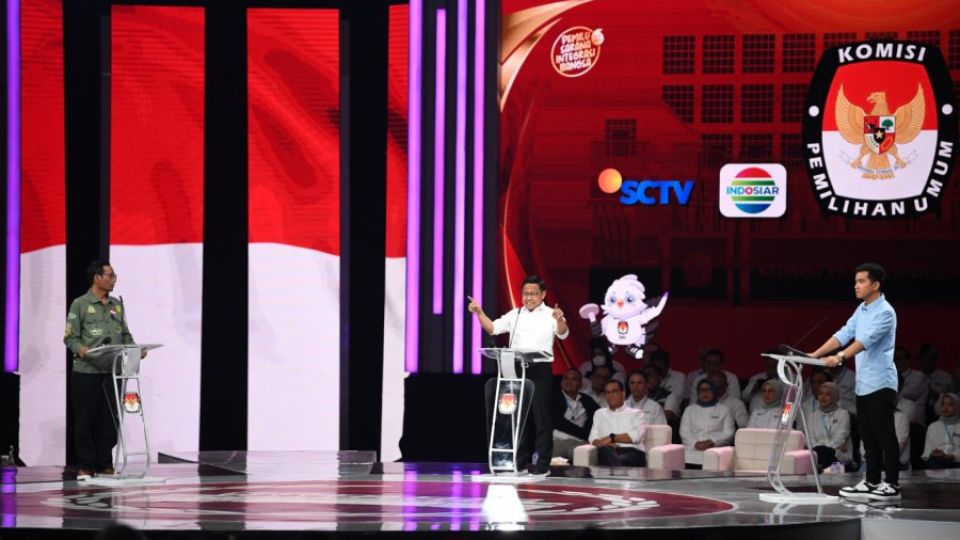January 24, 2024
JAKARTA – Vice presidential candidate Gibran Rakabuming Raka has come under fire for his performance at the fourth televised presidential election debate on Sunday, with many on social media interpreting his remarks as arrogant as he significantly broke away from the traditional Javanese values of restraint and the courteous expression of opinion, unlike his older rivals.
Gibran, the eldest son of President Joko “Jokowi” Widodo, went up against rivals Muhaimin Iskandar, 57, of the National Awakening Party (PKB) and Coordinating Political, Legal and Security Affairs Minister Mahfud MD, 66, two experienced politicians also vying for the VP seat.
The debate was expected to spur important conversations around policies for energy, natural resources, agriculture, the environment and indigenous communities, but instead devolved into bouts of sparring and ad hominem arguments.
For the most part, Muhaimin and Mahfud teamed up to criticize the government’s policymaking, from failures in the food estate program to a perceived slight to environmental and social issues, such as the shrinking commitment to renewable energy targets.
Meanwhile, Gibran defended his father’s legacy and vowed to continue the downstreaming agenda that lies at the center of Jokowi’s economic policy, going so far as to accuse a rival of being anti-government. The 36-year-old was running on a platform of continuity.
After the debate, social media platforms buzzed with frustrated viewers bemoaning the fact that the debate was devoid of real solutions on the topics broached and was filled with gimmicky retorts and petty broadsides instead.
Many took aim at Gibran, whose attitude during the debate was considered “condescending”, especially to Muhaimin and Mahfud, who are more than 20 years his senior.
“Please don’t ever say that Gibran is representing the youth ever again, we don’t claim this cringe and arrogant person,” user @haramdyke wrote on X, formerly Twitter, in a post that gained more than 57,000 likes.
Negative sentiment
On Sunday, the President’s son doubled down on his strategy of employing jargon to catch his rivals off guard, which previously led the General Elections Commission (KPU) to alter debate rules.
In one exchange during the heated debate, Gibran remarked how his rival Muhaimin was unable to make use of a “cheat sheet” prepared for him by his campaign team.
At another point, Gibran mocked Mahfud for what he considered a failure to answer his question about “greenflation” and sneered when the moderator gave him a warning.
“I didn’t explain it to him because he is a professor, isn’t he?” the VP hopeful said.
Social media users suggested his jabs were “beyond unethical” and violated the rules, with data compiled by consulting firm Drone Emprit seemingly confirming the sentiment.
Drone Emprit found that over the course of the two-hour debate, a whopping 60 percent of posts on social media about Gibran were negative and only 33 percent were positive, while Muhaimin and Mahfud received overwhelmingly positive sentiments, with 80 percent and 79 percent of posts marked as positive for the two politicians, respectively.
The analysis covered commentary about the candidates, considered the words associated with each of them and counted the number of engagements on each post.
“Some social media users felt that Gibran did not deserve to be a representative of the youth, [and that] Mahfud remained calm even when Gibran tried to be ‘savage,’” Drone Emprit founder Ismail Fahmi concluded in his analysis on X.
A number of online posts criticizing Gibran have since gained traction.
“Gibran is trying so hard to be savage but I don’t know, it looks unnatural and cringe,” user @nabiylarisfa posted, garnering over 54,000 likes.
“There are manners in a debate, and Gibran has absolutely disrespected the forum. Of course Mahfud refused to be treated that way,” user @mfatahilahakbar said, raking in over 38,000 likes.
This sentiment was also shared by many outside of social media, including 17-year-old Haura from Bandung, West Java, who thought Gibran’s performance in the debate was “despicable”.
“His argument was meandering and he seemed like he was just trying to appeal to the younger generation. He doesn’t represent us,” she told The Jakarta Post on Monday.
Ethics and gimmicks
While Muhaimin and Mahfud also had their share of snarky remarks in Sunday’s debate and Gibran ended his performance with a show of deference to his elders, rival camps jumped on the chance to criticize the young VP candidate.
Indonesian Democratic Party of Struggle (PDI-P) secretary general Hasto Kristiyanto, who is campaigning for Mahfud, complained about how Gibran used the debate to humiliate his rivals.
“There’s a reason why the law used to require presidential and VP candidates to be at least 40 years old to run for office. Unfortunately, the Constitutional Court changed the rule,” he said in a statement on Monday. The court controversially paved the way for Gibran to run in October.
Separately, a member of the Anies Baswedan-Muhaimin campaign team suggested that Gibran had failed to follow his father’s own advice about refraining from personal attacks.
In response, a member of the Prabowo Subianto-Gibran campaign team insisted that Gibran posed questions and responded in accordance with KPU rules. “Though it may be gimmicky, the substance didn’t violate any rules,” campaigner Eddy Soeparno said after the debate.
Meanwhile, analysts and viewers alike bemoaned how the topics of the debate took a back seat to all the sparring.
Greenpeace Indonesia country director Leonard Simanjuntak said the candidates had failed to offer comprehensive, clear and measured strategies to end the climate crisis – a big concern.
“Extractive industries remain ingrained in Gibran’s policy goals, while Mahfud and Muhaimin failed to make any clear commitments to stop such practices,” he stated on Monday.
Twenty-five-year-old Rizki Fajar, a data analyst based in South Tangerang who is still on the fence over who to vote for, said he was left with many questions after the debate.
“There was no substance to what they all said; each question ended up sounding normative and without any debate around how to solve the issues,” Rizki said.


